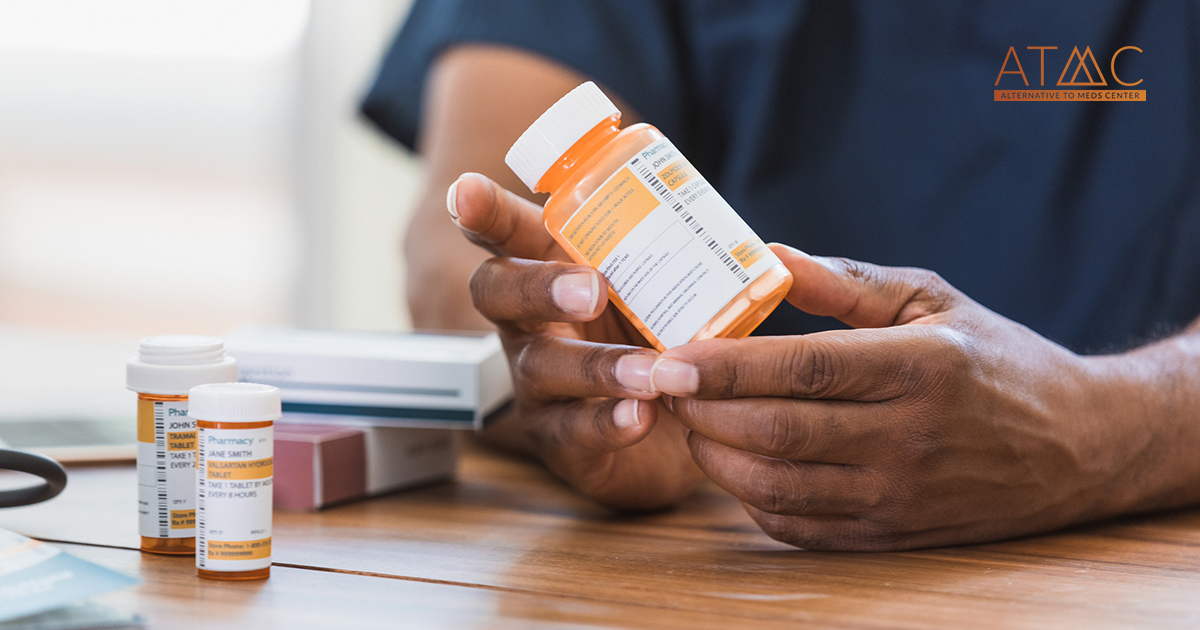Last Updated on August 30, 2022 by

Alternative to Meds Editorial Team
Medically Reviewed by Dr Samuel Lee MD
Last Updated on August 30, 2022 by

Alternative to Meds Editorial Team
Medically Reviewed by Dr Samuel Lee MD
If you’ve ever wondered whether you have anxiety, there are a few common symptoms to look out for. Symptoms can vary from person to person2, but some of the most frequently reported include:
Benzodiazepines are a type of prescription medication that is used to treat anxiety, panic disorder, and seizures by slowing down the activity of the central nervous system and helping the patient enter a state of relaxation3. While relaxation may sound wonderful to someone suffering from constant feelings of anxiousness, it is critical to remember that benzodiazepine drugs are a powerful medication and can be extremely habit-forming. The substance is quick-acting and can provide relief. In fact, many users find it difficult to resist. Benzodiazepines are notoriously addictive, especially used long-term.
What Are Some Common Examples of Benzos?
Some common examples of benzos include:
This is the most prescribed benzo. It is FDA approved for short term use, but safety has not been established to determine a recommended duration of use.
This medication is meant to help with anxiety, but paradoxically can increase anxiety over time, as is the case for all benzodiazepines.8 alcohol withdrawal symptoms, and muscle spasms. It is also used before surgery to help with relaxation.
This medication is FDA approved to treat panic disorders and seizures, and it should not be stopped abruptly. Doing so can cause withdrawal symptoms of significant severity, as is the case with all benzo drugs.. You should work closely with your doctor to find the right dosage and determine the best method to stop the medication.
This medication can be used for anxiety, insomnia, and as a sedative.
This medication is often used to treat acute alcohol withdrawals and can also be prescribed for anxiety. It comes in capsule form or as a liquid and was the first ever benzodiazepine drug produced, and was the prototype for the many other benzo drugs that followed. Despite it having been around for more than 70 years, it is still not known how it works, or what happens if it is taken long term as studies have not been done.
Regardless of which benzo you are prescribed, it is important to read the medication guide and talk with your doctor about any questions or concerns that you may have. Understanding the risks and benefits of taking benzos for anxiety can help you make the best decision for your health.
There are several risks associated with taking benzodiazepine for anxiety. Benzodiazepine side effects3 include:
As mentioned, benzodiazepines are a highly addictive substance and are oftenis often abused. The body rapidly builds up tolerance to this medication, requiring you to take more to experience the same effects. This can quickly lead to addiction or dependency that is both physically and psychologically damaging.
When you stop taking any benzodiazepine, your body may experience unpleasant withdrawal symptoms, such as headache, nausea, vomiting, psychosis, hallucinations, seizures, and tremors. These can be quite severe and can last for weeks or even months.
Please pluralize when referring to benzodiazepines as a class of drugs Benzodiazepine can impact your cognitive abilities, making it difficult to think clearly or focus. It can also cause memory problems.
Benzodiazepine can have negative interactions when taken in combination with other medications and substances, including over-the-counter drugs and alcohol.
Benzodiazepine can have a negative impact on your mental health and can even increase your risk of depression.
Benzodiazepine can cause drowsiness and fatigue. This can make it difficult to function normally during the day and can increase your risk of accidents.
Benzodiazepine can cause a lack of motor control, including loss of coordination and dizziness. This can increase your risk of falls and other accidents and further increase your risk for injury.
Some people have experienced benzodiazepine causing blurred vision and other visual changes. This can impact your quality of life, as well as your ability to drive or perform other tasks.
Some people have experienced speech issues with benzodiazepine, especially slurred speech. This can impact your quality of life by making it difficult for you to communicate with others. Others may also perceive you as drunk or high.
Some people have experienced forgetfulness after taking benzodiazepine. Forgetfulness can impact your quality of life and make it difficult for you to complete tasks efficiently.
Benzodiazepine causes slowed breathing in some individuals. At severe levels, this symptom can be dangerous and requires immediate medical attention.
Some people have experienced benzodiazepine causing weakened muscles. Weak muscle tone can make it difficult to move and function properly.
This extensive list of potential risks is why it is important to thoroughly discuss the potential benefits and risks of taking benzodiazepine with your doctor before starting treatment. Experiencing any number of these side effects can cause significant disruption in your daily activities and negatively impact your quality of life.
Another risk associated with taking benzodiazepine is that it can make your anxiety worse.4 This phenomenon occurs in some individuals because when you take benzodiazepine, you are suppressing your anxiety symptoms. This can lead to a false sense of security and make it difficult for you to learn to deal with anxiety when it returns.
In other words, benzodiazepine is often used as a quick fix that simply masks your anxiety symptoms. Most antianxiety medications are not for long-term use, so when you stop taking the medication, your anxiety symptoms will no longer be suppressed. In fact, it may take more time for you to recover from an anxiety attack when you are no longer taking benzodiazepine.
Therefore, it is important to weigh the risks and benefits of taking benzodiazepine before starting treatment. It is also important to have a solid support system in place to help you deal with any potential setbacks that may occur while taking this medication.
It is also important to note that benzodiazepine can have serious negative interactions when taken in combination with other substances, including alcohol and certain medications.5
Benzodiazepine has a depressive effect on the central nervous system, as does alcohol. Combined, the two substances can lead to increased feelings of sedation, confusion, and even coma. Benzodiazepine can also have negative interactions with other medications you may be taking for anxiety or another condition. This can lead to serious health risks.
For these reasons, it is important to always check with your doctor before taking benzodiazepine in combination with alcohol or other medications. It is crucial to be honest about any potential substance abuse patterns you may have so your doctor can determine if benzodiazepine is the best medication for you. In most cases, patients with the above risk factors should seek alternative treatment.
Many people experiencing anxiety have asked, “which benzo should be avoided in anxiety treatment?” In fact, most ultra-short-acting benzodiazepines (Halcion) and benzos with a high potential for abuse (Xanax) should be avoided. The positive news is that there are alternatives to benzodiazepine for anxiety. Some of these alternatives include:
Cognitive Behavioral Therapy (CBT) is a type of therapy that can be effective in treating anxiety disorders. CBT involves talking to a therapist about your anxiety and how it impacts your life. You will learn to identify patterns of thinking or behaviors that may contribute to your symptoms.
Meditation is the practice of focusing on a single thing, such as breathing or a mantra, to calm the mind and body. There are several distinct types of meditation, so it is important to find one that works best for you.
Exercise can be an effective way to treat anxiety by releasing endorphins, which are chemicals in the brain that make you feel good. Exercise can also help you to relieve stress and tension and provide an alternative focus.
Eating a healthy diet can help to support your mental health and well-being. Eating foods high in omega-fatty acids, such as salmon or nuts, can help support your mood.
These are just some of the alternative solutions to treating anxiety with benzodiazepines, and a reputable treatment provider will consider incorporating most or all these options. Consulting with an alternative medical center is always a wise decision when looking for alternative solutions to traditional medicine. In fact, one study shows how 87.5% of participants were able to achieve long-term, anxiety-free success using various non-toxic and natural substances to treat the root cause of their anxiety.
If you are struggling with an addiction to benzodiazepine, there is help available. Treatment for a benzo addiction can include detoxification, therapy, and support groups.
We are committed to providing you with the best care possible and helping you achieve a life free from addiction and the harmful side effects prescription medicine can cause. Learn more about benzodiazepine withdrawal and our programs.
- Craske, M. G., Rauch, S. L., Ursano, R., Prenoveau, J., Pine, D. S., & Zinbarg, R. E. (2011). What is an anxiety disorder? Focus, 9(3), 369-388.
- Julian, L. J. (2011). Measures of anxiety. Arthritis care & research, 63(0 11).
- O’Brien, C. P. (2005). Benzodiazepine use, abuse, and dependence. J Clin Psychiatry, 66(Suppl 2), 28-33.
- Michelini, S., Cassano, G. B., Frare, F., & Perugi, G. (1996). Long-term use of benzodiazepines: tolerance, dependence and clinical problems in anxiety and mood disorders. Pharmacopsychiatry, 29(04), 127-134.
- Chan, A. W. (1984). Effects of combined alcohol and benzodiazepine: a review. Drug and alcohol dependence, 13(4), 315-341.
- Substance Abuse and Mental Health Services Administration. Impact of the DSM-IV to DSM-5 Changes on the National Survey on Drug Use and Health [Internet]. Rockville (MD): Substance Abuse and Mental Health Services Administration (US); 2016 Jun. Table 3.15, DSM-IV to DSM-5 Generalized Anxiety Disorder Comparison. Available from: https://www.ncbi.nlm.nih.gov/books/NBK519704/table/ch3.t15/
- Aucoin M, LaChance L, Naidoo U, Remy D, Shekdar T, Sayar N, Cardozo V, Rawana T, Chan I, Cooley K. Diet and Anxiety: A Scoping Review. Nutrients. 2021 Dec 10;13(12):4418. doi: 10.3390/nu13124418. PMID: 34959972; PMCID: PMC8706568.
- Guina J, Merrill B. Benzodiazepines I: Upping the Care on Downers: The Evidence of Risks, Benefits and Alternatives. J Clin Med. 2018;7(2):17. Published 2018 Jan 30. doi:10.3390/jcm7020017

Dr. Samuel Lee is a board-certified psychiatrist, specializing in a spiritually-based mental health discipline and integrative approaches. He graduated with an MD at Loma Linda University School of Medicine and did a residency in psychiatry at Cedars-Sinai Medical Center and University of Washington School of Medicine in Seattle. He has also been an inpatient adult psychiatrist at Kaweah Delta Mental Health Hospital and the primary attending geriatric psychiatrist at the Auerbach Inpatient Psychiatric Jewish Home Hospital. In addition, he served as the general adult outpatient psychiatrist at Kaiser Permanente. He is board-certified in psychiatry and neurology and has a B.A. Magna Cum Laude in Religion from Pacific Union College. His specialty is in natural healing techniques that promote the body’s innate ability to heal itself.

Lyle Murphy is the founder of the Alternative to Meds Center, a licensed residential program that helps people overcome dependence on psychiatric medication and addiction issues using holistic and psychotherapeutic methods.
Can you imagine being free from medications, addictive drugs, and alcohol? This is our goal and we are proving it is possible every day!
Read All StoriesView All Videos